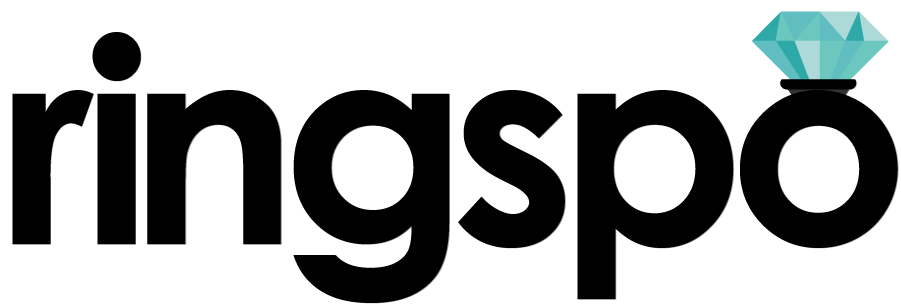Sell Your Diamond Necklace
Understand Where To Sell Your Diamond Necklace To Get The Best Price

By Alastair Smith · Updated: June 13th 2023
Currently looking to sell a diamond necklace but want to make sure you get the best price for it?
Of course you do.

Ringspo is reader supported
Ringspo is reader-supported, which means we may receive a commission if you click a link to a retailer & subsequently make a purchase.
We feature links to several retailers to help readers find the one that is the best fit for them. Find out more about how Ringspo works here.
Three things to know if you are looking to sell your diamond necklace
- Selling a diamond necklace is like selling a second-hand car – you won’t get the ‘list price’ ie. the appraisal value
- There’s a while host of factors that will affect how much you will receive – total carat weight of the diamonds, the quality of the diamonds, brand name, condition and the market demand at they time you’re selling.
- Finding the right buyer is key to get the most money possible. We recommend Worthy as they will get your necklace out in front of as many potential buyers as possible, which can increase you sale price.
Why Your Receipt or Appraisal Isn’t Necessarily the Best Indicator of What Your Diamond Necklace is Actually Worth
First-off, we’re going to get this slightly awkward bit out of the way.
While you may have the original purchase receipt or an appraisal for your diamond necklace that has a price or a valuation on it, they almost certainly don’t necessarily represent its current market worth if you were to put it up for sale.
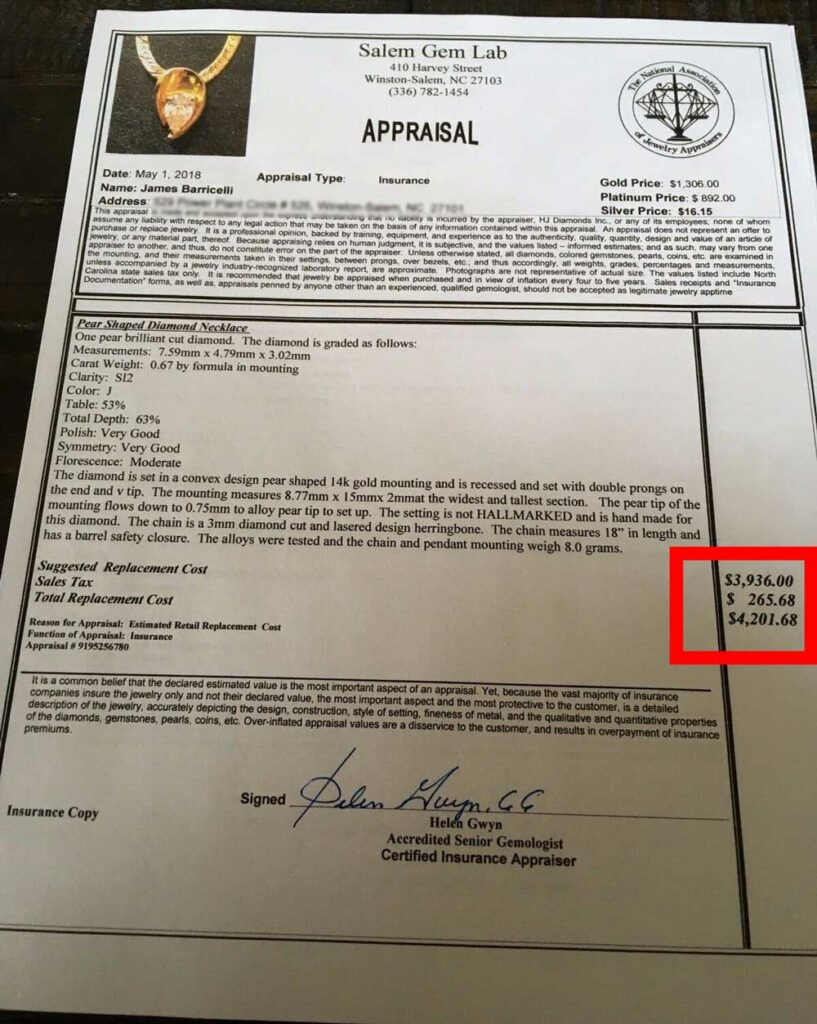
This is because anyone who is going to buy your bracelet will be looking to sell it for a price that is appropriate for a pre-owned piece of jewelry. Plus, they need to cover their own costs and build in some profit margin for themselves.
What appraisals or a receipt are useful for:
Both a purchase receipt and an appraisal should contain essential information about your bracelet such as its total carat weight, the color, clarity, cut or the diamonds and the type and quality of the metal in the bracelet itself.
This is all essential information that you’ll need when selling as it will allow potential buyers to understand what you have.
Factors That Affect the Value of a Diamond Necklace
When we talk about the value of a diamond necklace, we’re really talking about how much someone would be willing to pay for it.
It’s important to understand the various factors that influence this value – this will help ensure you receive a fair and accurate appraisal and subsequently, the best price possible when selling.
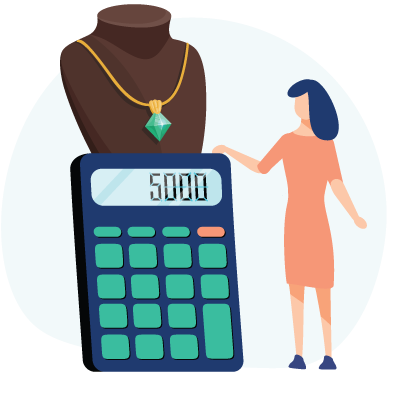
Brand Name
As with many products, the brand name attached to your diamond necklace can significantly influence its price. Prestigious brands like Tiffany & Co. often command higher prices due to their recognized quality, unique designs, and customer loyalty.
If your necklace doesn’t have a brand name attached,
Total Carat Weight
The combined weight of all the diamonds in your necklace, or the total carat weight, plays a substantial role in determining its value.
Larger total carat weights typically equate to higher prices, although the quality and size of each individual diamond also matter.
Diamond Quality
Each diamond in your necklace is evaluated on its color, clarity, cut, and carat weight, often referred to as the “4Cs” – first established by GIA.
High-quality diamonds increase the value of your necklace, but consistency in quality across all diamonds is also important.
Precious Metal Used
The type and purity of the metal that makes up your necklace can affect its price. Diamond necklaces are commonly made from gold, platinum, silver, or palladium.
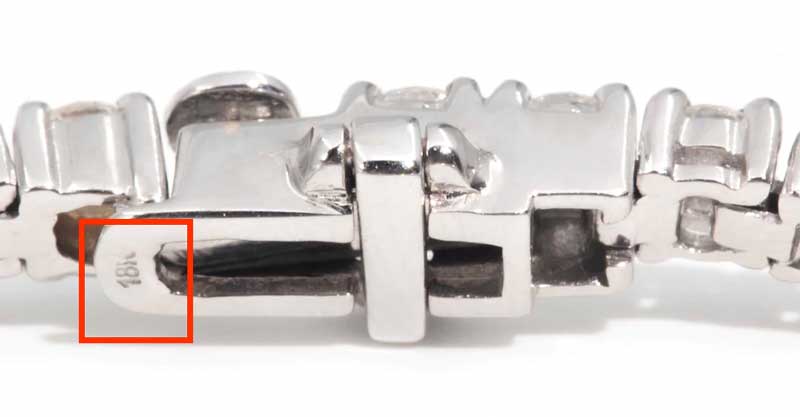
More precious and rare metals, like platinum, can boost the value of your necklace. However, market prices and demand for specific metals can fluctuate.
Condition
The state of your diamond necklace, including how well it’s been maintained and preserved over time, impacts its value. Pieces in better condition are often worth more. But keep in mind that age and rarity can also factor into this.
Diamond Necklace Styles and Their Impact on Selling Price:
When selling a diamond necklace, the style and design of the necklace can significantly influence the selling price. Different necklace styles, diamond settings, and overall aesthetics can impact the perceived value and market demand. Here are some common diamond necklace styles and their potential impact on the selling price:
1. Solitaire Pendant Necklace:
A solitaire pendant necklace features a single diamond as the focal point, often hanging from a chain. It is a classic and timeless style that emphasizes the beauty of a single diamond.
The size and quality of the solitaire diamond will have a significant impact on the price. As you’d expect, Llarger carat weights and higher-quality diamonds will generally command higher prices.
2. Diamond Tennis Necklace:
A diamond tennis necklace is a continuous strand of diamonds set close together, creating an unbroken line of sparkle.
Here it’s not the weight of a single diamond that matters, but rather the total carat weight of the diamonds in the tennis necklace.
One other consideration is how the total carat weight is split up amongst the diamonds.
3. Diamond Station Necklace:
A diamond station necklace features evenly spaced diamonds along a chain, creating a simple yet elegant look. Diamond station necklaces tend to have a far lower total carat weight than tennis necklaces, so are likely to sell for a lower price.
The metal used for the chain and the settings, as well as any additional design elements or embellishments, can influence the overall price.
4. Diamond Collar Necklace:
A diamond collar necklace is a luxurious and elaborate style that typically features multiple rows of diamonds set closely together around the neck.
The design complexity and craftsmanship, including the arrangement and intricacy of the diamond rows, can contribute to higher prices, and then the total carat weight and
5. Diamond Pendant Necklace:
A diamond pendant necklace features a diamond or a cluster of diamonds as the centerpiece, suspended from a chain. The pendant design can vary widely, from simple to intricate, and this design can make a significant difference to the selling price.
Pendant necklaces featuring larger and higher-quality diamonds will generally command higher prices, while a necklace with a cluster pendant is likely to be priced lower.
Best Place to Sell a Diamond Necklace:
When you’re selling a diamond necklace, it can be tempting to go for a quick, easy sale. However, doing do can mean that you receive significantly less than you should.
If you’re in a hurry to sell and simply Google ‘diamond necklace buyers near me’ and then choose the first on the list, it’s likely that you will receive significantly less for your earrings than you should.

When selling your diamond necklace, it is essential to choose a reputable buyer who will offer a fair price and a smooth transaction.
Different selling options come with their unique pros and cons:
Online Platforms
Several online platforms specialize in buying and selling diamond jewelry, including Worthy.com, WP Diamonds, The Diamond Valet.
With these platforms, you send your necklace for a free evaluation and authentication, they then list your necklace on their website for potential buyers to bid on, handle the payment and shipping process, and take a commission fee from the final sale price.
One of the best ways to understand how much you’re likely to get for your diamond necklace is to check out Worthy.com’s ‘recent auctions’:
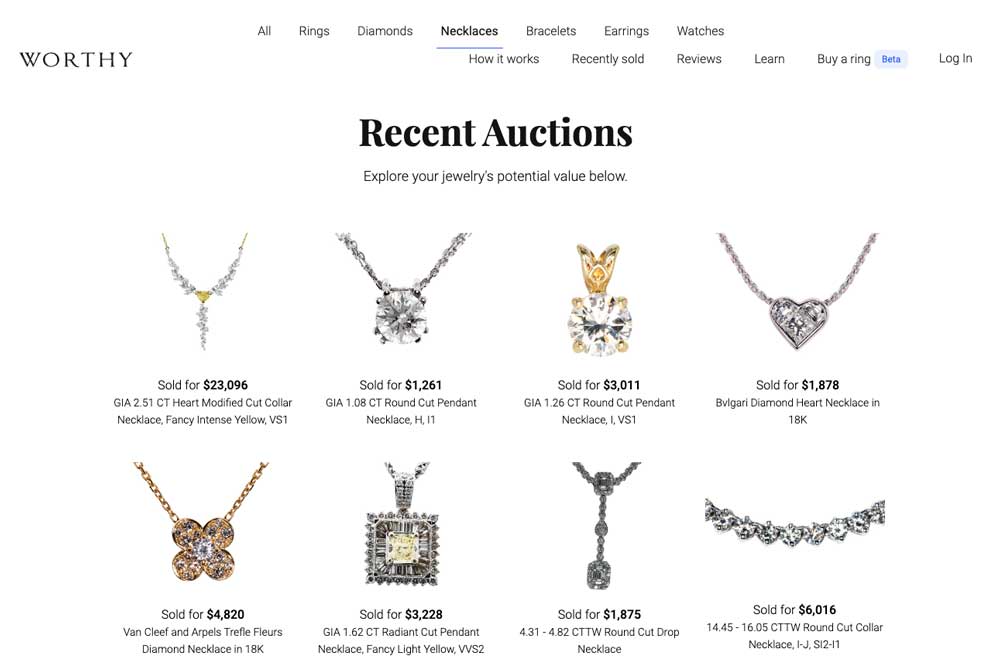
There’s a huge variety of necklaces that have recently been sold so you should hopefully be able to find one similar to yours, which could help you understand how much yours might sell for.
Benefits of jewelry-specific platforms include a vast network of buyers looking for quality diamonds, competitive prices based on real-time market data, insurance, and security for your necklace during transit and storage, and available customer service throughout the process.
However, selling through these platforms may take longer, and they may not accept all types of diamonds or charge higher fees than other options.
Local Jewelers
Local jewelers are another option. Here, you bring your necklace to their store for inspection and appraisal. They make an offer based on their inventory and demand and typically pay you cash or check on the spot. They may also offer a trade-in option.
Local jewelers are convenient and accessible and can offer personal and professional service. However, they may not offer the best price compared to other options and may pressure you to sell quickly or accept a lower offer.
Pawn Shops
Pawn shops also buy and sell diamond jewelry – not just necklaces, but they will also buy diamond earrings, bracelets or anything else of value. They inspect and appraise your necklace, make an offer based on its resale value and demand, and pay you cash on the spot.
Pawn shops are fast and easy to deal with, require minimal paperwork, and may accept any type of necklace or diamonds. However, they often offer the lowest price and may not be very knowledgeable or honest about the value of your necklace.
Auction Houses
Auction houses like Sotheby’s, Christie’s, and Heritage Auctions are also an option. You submit your necklace for evaluation and authentication, and they list it for potential buyers to bid on.
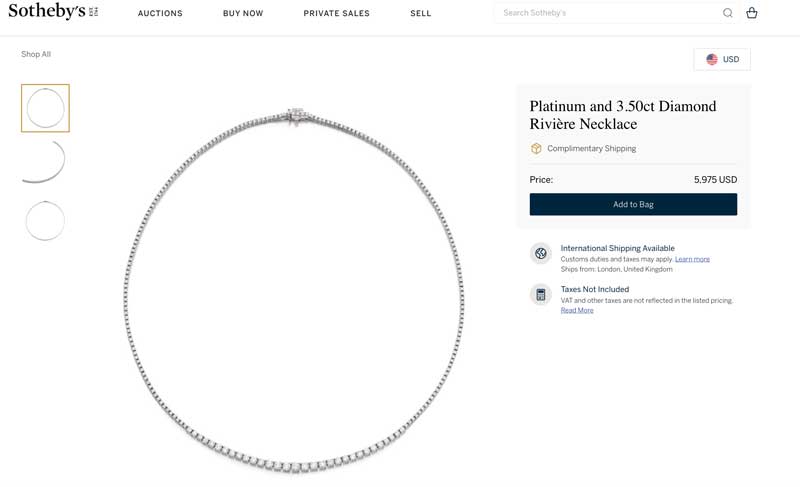
Auction houses often attract buyers looking for rare or unique diamonds and can offer high prices. However, selling through them may take longer, and they might not accept all types of necklaces or charge higher fees.
Consignment Shops
Consignment shops, including The RealReal, Tradesy, Poshmark, allow you to send your necklace for evaluation and authentication, then list it for potential buyers.
These shops often attract buyers looking for affordable and fashionable diamonds. They offer reasonable prices based on your necklace’s condition and style. However, selling through these shops might take longer, and they may charge higher fees or have quality issues or disputes with buyers that affect your profit.
In summary, when choosing where to sell your diamond necklace, consider the price, speed, convenience, security, and reputation of the buyer. Understanding these aspects will help you make an informed decision and get the best value for your necklace.
How to Avoid Common Pitfalls and Scams When Selling Your Diamond Necklace
Selling your diamond necklace online is convenient, but it is important to avoid common pitfalls and scams to protect yourself from potential loss or legal disputes.
Here are a few examples of scams and some tips on how to avoid them.
Lowball Offers: Some buyers may offer an unreasonably low price for your diamond necklace, exploiting your lack of knowledge or urgency to sell. They may create a false narrative about the quality or value of your necklace to justify their low offer.
Fake Buyers: This involves individuals who pretend to be interested in your necklace, but their real intention is to scam you out of money or valuable information. They may send fake checks or money orders, ask you to pay for shipping or insurance fees upfront, or request personal or financial information.
Refund fraud: A common scam is for a supposed buyer to diamond necklace at an inflated price, possibly through a fraudulent means like stolen credit card details. After receiving the necklace, they file a chargeback, claiming unauthorized use of their card, and get their money refunded while keeping the expensive item.
How to Avoid These Scams
Do Your Homework: Research the buyer’s background and reputation. Check their ratings, reviews, testimonials, credentials, and contact information. Always verify their identity and payment method and ask for references from previous sellers.
Use Reputable Platforms: Use a trusted and reputable online platform that specializes in buying and selling diamond necklaces. These platforms often offer security and protection features such as escrow services, insurance coverage, dispute resolution, and customer support.
Be Cautious and Vigilant: Never share personal or financial information unless you’re sure the buyer is legitimate. Do not send your necklace until you receive full payment through a secure method. Be wary of clicking links or attachments unless you’re sure they’re safe.
By keeping these tips in mind, you can ensure a safer, smoother transaction when selling your diamond necklace online.
Summing Up: Our Recommendation on Where to Sell Your Diamond Necklace
It’ important to select the selling option that aligns with your goals, preferences, and situation. Carefully weigh the pros and cons of each option and negotiate for the best deal possible.
However, we have found that one option provides the best choice for most people.
Worthy.com: The Best Way To Sell a Diamond Necklace For Most People
Worthy is an auction site that gets your earrings out in front of hundreds of jewelry buyers to bid on.
This scale means that higher sales prices can be achieved, but Worthy’s commissions do need to be take into account when calculating how much you will actually receive into your pocket.
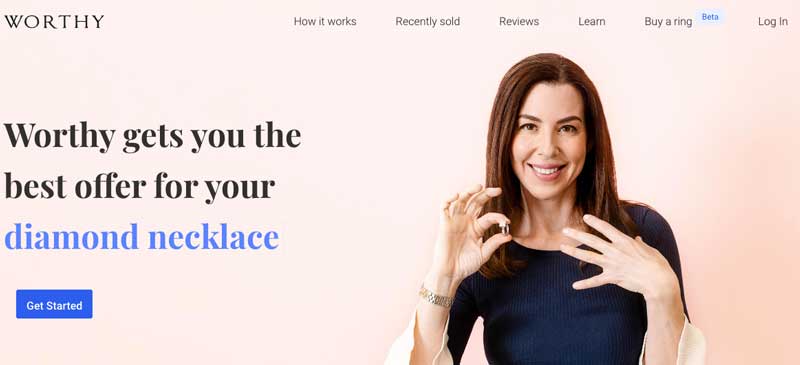
And again, if you haven’t checked it out, the ‘recent auctions‘ page to see how much diamond necklaces like your have sold for, it’s definitely worth checking out.
